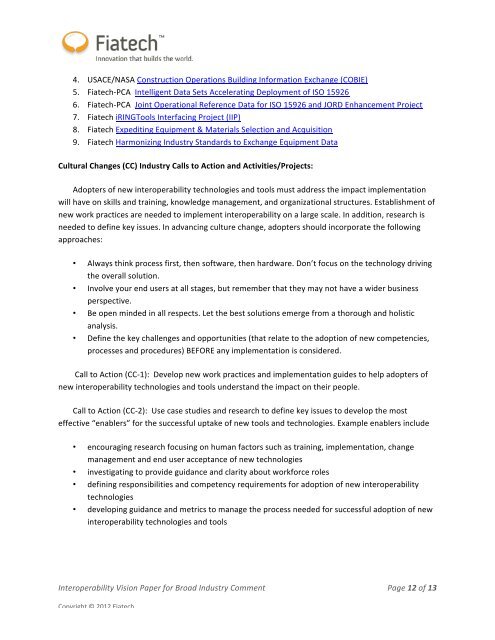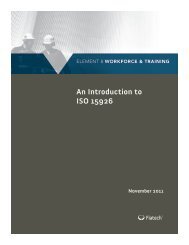Advancing Interoperability for the Capital Projects ... - iRINGToday
Advancing Interoperability for the Capital Projects ... - iRINGToday
Advancing Interoperability for the Capital Projects ... - iRINGToday
You also want an ePaper? Increase the reach of your titles
YUMPU automatically turns print PDFs into web optimized ePapers that Google loves.
4. USACE/NASA Construction Operations Building In<strong>for</strong>mation Exchange (COBIE) <br />
5. Fiatech-‐PCA Intelligent Data Sets Accelerating Deployment of ISO 15926 <br />
6. Fiatech-‐PCA Joint Operational Reference Data <strong>for</strong> ISO 15926 and JORD Enhancement Project <br />
7. Fiatech iRINGTools Interfacing Project (IIP) <br />
8. Fiatech Expediting Equipment & Materials Selection and Acquisition <br />
9. Fiatech Harmonizing Industry Standards to Exchange Equipment Data <br />
Cultural Changes (CC) Industry Calls to Action and Activities/<strong>Projects</strong>:<br />
Adopters of new interoperability technologies and tools must address <strong>the</strong> impact implementation <br />
will have on skills and training, knowledge management, and organizational structures. Establishment of <br />
new work practices are needed to implement interoperability on a large scale. In addition, research is <br />
needed to define key issues. In advancing culture change, adopters should incorporate <strong>the</strong> following <br />
approaches: <br />
• Always think process first, <strong>the</strong>n software, <strong>the</strong>n hardware. Don’t focus on <strong>the</strong> technology driving <br />
<strong>the</strong> overall solution. <br />
• Involve your end users at all stages, but remember that <strong>the</strong>y may not have a wider business <br />
perspective. <br />
• Be open minded in all respects. Let <strong>the</strong> best solutions emerge from a thorough and holistic <br />
analysis. <br />
• Define <strong>the</strong> key challenges and opportunities (that relate to <strong>the</strong> adoption of new competencies, <br />
processes and procedures) BEFORE any implementation is considered. <br />
Call to Action (CC-‐1): Develop new work practices and implementation guides to help adopters of <br />
new interoperability technologies and tools understand <strong>the</strong> impact on <strong>the</strong>ir people.<br />
Call to Action (CC-‐2): Use case studies and research to define key issues to develop <strong>the</strong> most <br />
effective “enablers” <strong>for</strong> <strong>the</strong> successful uptake of new tools and technologies. Example enablers include <br />
• encouraging research focusing on human factors such as training, implementation, change <br />
management and end user acceptance of new technologies <br />
• investigating to provide guidance and clarity about work<strong>for</strong>ce roles <br />
• defining responsibilities and competency requirements <strong>for</strong> adoption of new interoperability <br />
technologies <br />
• developing guidance and metrics to manage <strong>the</strong> process needed <strong>for</strong> successful adoption of new <br />
interoperability technologies and tools <br />
<strong>Interoperability</strong> Vision Paper <strong>for</strong> Broad Industry Comment <br />
Page 12 of 13 <br />
Copyright © 2012 Fiatech.



